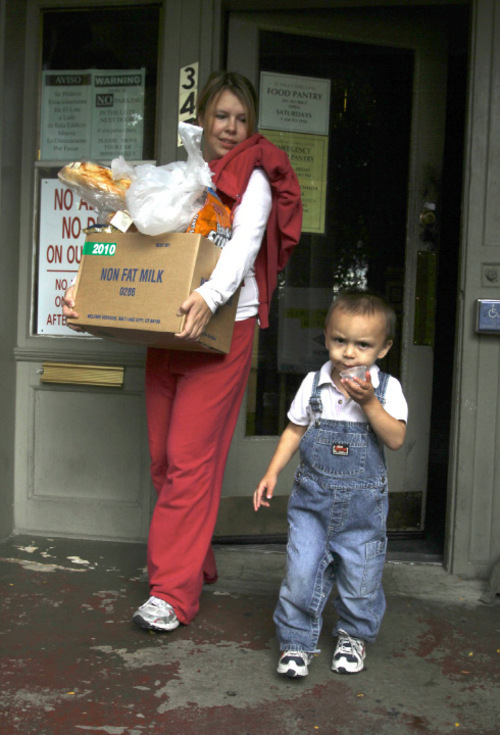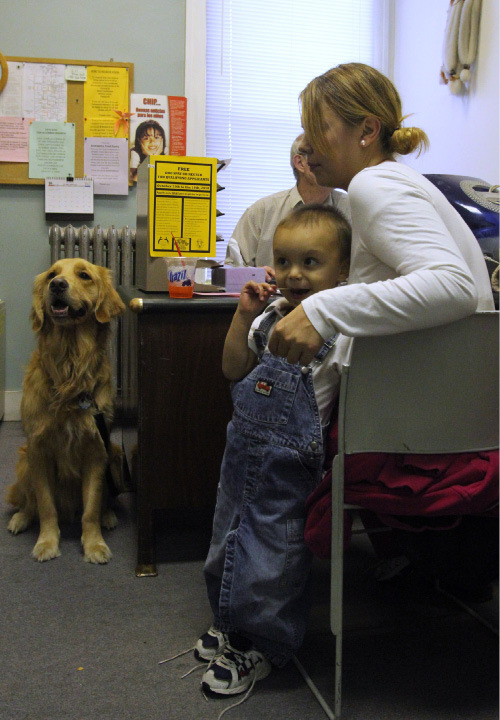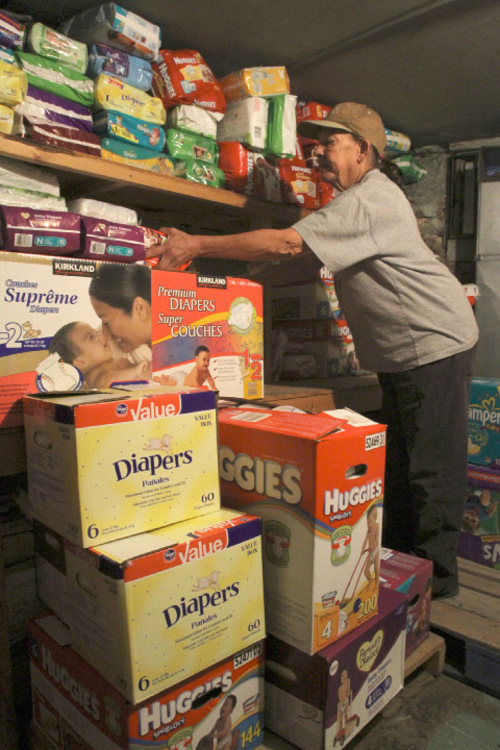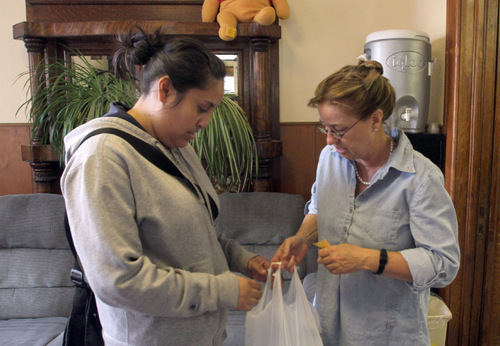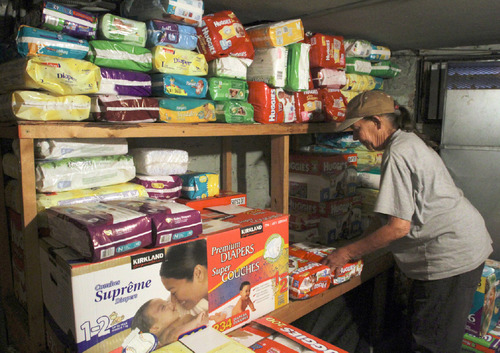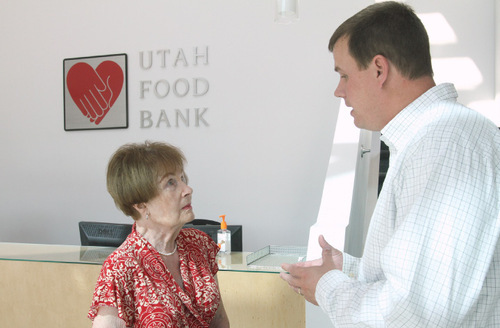This is an archived article that was published on sltrib.com in 2010, and information in the article may be outdated. It is provided only for personal research purposes and may not be reprinted.
Lazy and entitled. That's how some older Utahns see young people who are poor and spending money on disposable diapers.
When seniors read a recent story in The Salt Lake Tribune about low-income mothers choosing between groceries and throw-away diapers — sometimes spending $100 or more a month on diapers — many of the retirees launched into action: checking out fabric, planning production and wondering what went wrong.
Their argument is steeped in economics more than the environment.
"I'm wondering where their mothers are and their grandmothers that aren't teaching them these things," said Carol Greely, 73, of Holladay. "It would be cheaper to go to the laundromat rather than buying new diapers every three days."
Disposable diapers were the technology of the future when these women were young parents. When money was limited, they often made the diapers themselves, cleaning them in kitchen sinks and bathtubs if they couldn't afford a washing machine.
After World War II, Alice Olsen, now 87, discovered diapers weren't available to purchase, due to the many shortages of the era. So she bought blankets, cut them into diaper shapes and hemmed the edges.
"Where there is a will, it seems to me there is a way," she said.
Last week several seniors told community groups they want to reach out to the younger generation. Some women are considering making cloth diapers to provide to the many agencies that are constantly in need of donations. Others want to educate parents on how to use them, such as the steps to keep them clean and sanitized.
The introduction of disposable diapers several decades ago shifted the general population away from using cloth versions, which were typically perceived as much more of a hassle.
But over time, concern grew over the impact of disposable diapers on landfills. Some families have returned to using cloth, amid debate about the environmental consequences — whether the water and energy used for washing eliminates the benefit of reusing Junior's diaper.
Not every community group is convinced that cloth diapers would work for their low-income clients. Advocates question whether parents today would know how to properly wash the material or have the ability to keep the diapers sanitized. Impoverished parents do not always have access to a washing machine or even a bathtub, particularly if they're homeless.
"I think there would be a sanitary problem, for one thing," said Dennis Kelsch, program manager for emergency assistance at St. Vincent de Paul Resource Center in Salt Lake City.
He worried cloth diapers would be used once and thrown away. Though his agency is always in need of donated diapers, its preference is for disposable.
"I will not give out cloth diapers," said Rachel Fischbein, emergency services director at Crossroads Urban Center, a nonprofit serving the poor. "We have so many people who don't have regular access to washing machines."
But should cloth diapers be donated, she plans to hand them to Crossroads' thrift store. Interested families will be given a voucher to get them for free.
Compounding the problem is day care, often a necessity for working parents. A 2010 study sponsored by the Huggies diaper brand pointed out that some providers do not accept cloth diapers, making the choice less practical for those families.
At The Road Home, the Salt Lake City homeless shelter, staff members are open to the possibility of residents washing cloth diapers in the communal laundry. But James Woolf, director of operations, worries people without stable homes might end up carrying used ones around.
"So if they are living at somebody's house or had to stay in a car one night, that would definitely be a barrier," he said.
Another challenge is having the money up front to purchase an adequate supply. Panhandling at The Gateway mall recently provided Carl Dowling the cash to buy about 160 disposable diapers for his 5-month-old girl. He's not opposed to using cloth — the 48-year-old was raised with them — but paying to wash them at the shelter diminishes the appeal.
"You cannot wash for free," he said. "It's a dollar to wash and a dollar to dry."
Whether cloth or disposable, shelter staff members say diapers of all kinds are needed for residents. Tokens for free laundry are available.
Jack Albretsen, 66, is convinced young American parents of today don't want to get their hands dirty. When his three boys were young, they all wore cloth diapers. The family used disposable diapers on vacations. His wife did not work at that time, although he does not believe a job is an adequate excuse for wasting money on disposable diapers.
"Kids today believe that they cannot live without iPods, computers, digital TV, Xbox, cell telephones, quick food stores, microwaves, clothes driers and disposable diapers, because that is all they know," he said.
Change may be coming. Though cloth diapers haven't been "on the radar" of many parents she sees, "with the whole generation coming about, I think we will see more interest," said Tamara Anderson, executive director of the Pregnancy Resource Center in Salt lake City, which is happy to take donations of cloth or disposable diapers.
At 64, Sue Copinga of Elmo, remembers switching to disposable diapers with her fifth child when the family was better off financially. For her, they had become an affordable luxury.
"If my choice were between disposable diapers and clothing my child or feeding them, it wouldn't be much of a choice," said Copinga, who wants to buy some material to make cloth diapers to donate. "That is assuming I had given up smoking, drinking soft drinks, turned off the cable TV, and given up my cell."
Cloth versus disposable
Some seniors say young parents should use cloth diapers and save money.
Some low-income advocates argue disposable diapers are more practical, in part because many low-income families don't have regular access to washing machines. —
Where to donate
Most organizations that serve poor families regularly need diapers and wipes. Some organizations may prefer either cloth or plastic diaper donations. Here are a few examples:
Catholic Community Services
Ogden and Salt Lake City
801-394-5944 or 801-977-9119
Crossroads Urban Center
801-364-7765
Hartvigsen School
385-646-4585
House of Hope
801-487-3276
Pregnancy Resource Center
801-363-5433
Reach Salt Lake
801-972-5708
The Road Home
801-359-4142
Utah Food Bank
801-978-2452
YWCA
801-537-8601


